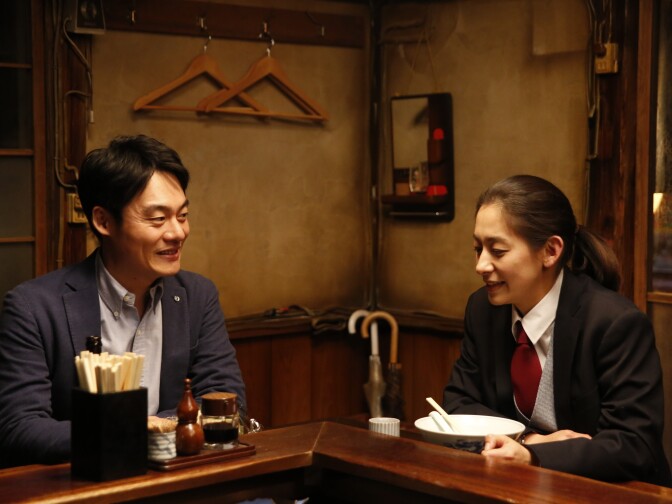This story is free to read because readers choose to support LAist. If you find value in independent local reporting, make a donation to power our newsroom today.
Cozy up in Tokyo's 'Midnight Diner' for the TV version of comfort food

Since the strikes began in Hollywood, the usual torrent of new shows has slowed to a trickle. People keep asking me what older shows they should watch. Was there anything great that they might have missed along the way? You know, something they would love as much as they loved The Bear.
I always recommend Midnight Diner, the strangely addictive Japanese series whose 24-minute episodes unfold with the lazy looseness of happy hour. Now, the show is anything but hot or zeitgeisty. It first appeared on Netflix seven years ago and hung around for so long that, a few months back, the streamer stopped showing the first three seasons, leaving its huge, loyal fan base bereft. You see, part of Midnight Diner's appeal is that it's one of those timeless shows that's always there for you. Suddenly, it wasn't.
Happily, the show is now back on Netflix in its entirety, and like millions of others, I haven't been able to resist re-watching. The show's setting is a dimly lit alleyway in the teeming Tokyo neighborhood of Shinjuku. There you find the Midnight Diner, a small, all-night joint run by the chef known only as Master, played by a quietly charismatic Kobayashi Kaoru, whose stony countenance is broken by flickers of amusement and compassion.
Master's counter is filled with regulars, including an exotic dancer named Marilyn, the cheery old boozer who's her biggest fan, a besuited salaryman who moves like a bird, three high-spirited bachelorette office workers and a self-styled monk who utters nonsensical aphorisms.
The episodes have the simplicity of folk tales or dinner party anecdotes. In each, we meet new characters — cartoonists, con women, cops, yakuza, old married couples and lovestruck youngsters — who ask the Master to cook them a particular off-the-menu dish: wieners cut in the shape of octopi, say, or potato salad like their mom's.
Although modest, each dish means something big to the person who orders it. And these meals anchor the action as we, like Master and his regulars, follow the newcomers' fortunes — failed careers and overnight successes, romances found and lost, old wounds opened and transcended.
The original Midnight Diner was a purely Japanese concoction that ran for three seasons, starting in 2009. By American standards, those episodes were shambling, low-budget and uncynical. That changed a bit when Netflix started producing the series in 2016, changing the name to Midnight Diner: Tokyo Stories and making it a bit more like our homegrown TV, with slicker storylines and less reticence from the Master. Still, the show never lost what makes it irresistible.
Goofy and gently sad, Midnight Diner liberates you from angry politics, trashy reality stars and dramas about serial killers. It lands you in a universe where, even if bad things happen, the world is manageable and essentially benevolent. It creates a kindly mood that even a hard-bitten critic like me wants to enter, starting with one of the most seductive opening credit sequences of all time — taxis gliding through Tokyo neon, the dreamy theme by Suzuki Tsunekichi and, in a calm voice-over, the Master telling us about his diner. I never, ever skip these credits.
Even as the show is funny and attuned to Japanese obsessions, it taps into something deep and universal, a modern spiritual homesickness. Not only is Master a mysterious loner with no history, but his customers are loners too – either regulars for whom the diner's clientele become a de facto family or troubled souls drawn to his counter in the wee hours.
If anything links the characters, it's nostalgia — for family, for high school, for a lost love or an old-time pop idol. And as Marcel Proust taught us a century ago, nothing triggers memories better than food. It's one of the comical sides of the show that 95% of the customers declare the Master's down-home cooking "delicious" — a success rate that would make him the envy of the world's greatest chefs. Yet we grasp that what they're really tasting is the feeling unleashed by his dishes.
And Midnight Diner pleases us in a similar way. It's the TV version of comfort food.
Copyright 2023 Fresh Air. To see more, visit Fresh Air. 9(MDA1OTI3MjQ5MDEyODUwMTE2MzM1YzNmZA004))








